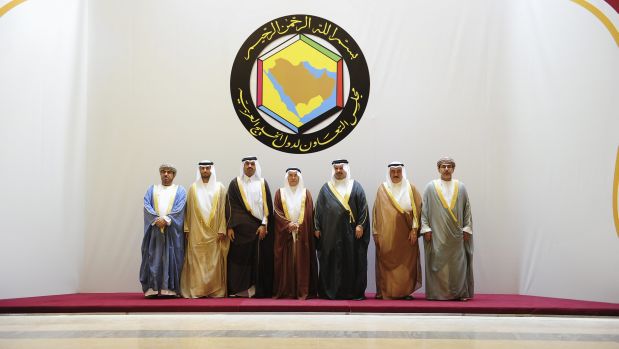
The Gulf Cooperation Council’s (GCC) Assistant Secretary-General Abdullah Bin Juma Al-Shibli, United Arab Emirates’ Oil Minister Suhail Mohamed Al-Mazrouei, Qatar’s Minister of Energy and Industry Mohammed Saleh Al-Sada, Saudi Oil Minister Ali Al-Naimi, Bahrain’s Minister of Finance Sheikh Ahmed Bin Mohammed Al Khalifa, Kuwait’s Minister of Finance Mustafa Al-Shamali and Oman’s Oil Minister Mohamed Bin Hamad Al-Rumhi pose for a group photo during a meeting of Gulf Arab oil ministers in Riyadh on September 24, 2013. (REUTERS/Faisal Al Nasser)
In recent weeks, a series of unusually blunt statements from senior officials in Oman and Kuwait has drawn attention to the need for urgent and systemic economic reform in Gulf Cooperation Council (GCC) states. The significance of their interventions is that they have kick-started a public debate about government spending and the inefficient use of subsidies that must be addressed if GCC economies are to be put on a path to sustainable growth.
Oman’s Oil and Gas Minister, Mohammed Bin Hamad Al-Rumhy, caused a stir at the Abu Dhabi International Petroleum Exhibition and Conference when he stated that energy subsidies in the region are not only unsustainable in the long-run, but also pose a significant threat to Gulf economies. Rumhy called for the phasing out of subsidies in order to end the culture of wasteful consumption—one where “you leave your air conditioning on for the whole summer when you go on holiday”—calling such acts a “crime” that is “really destroying us right now.”
It is hard to overestimate the distorting impact of energy subsidies in the Gulf’s Arab states. A recent report by the London-based think-tank Chatham House found that the six GCC states collectively consume more primary energy than the whole of Africa. In addition to the patterns of household consumption identified by Rumhy, other major drivers of demand are energy-intensive industrialization, water desalination, and the hyper-urbanization of Gulf cityscapes that are far from energy-friendly in design.
Yet, these trajectories present Gulf governments with a policy dilemma that has to be addressed sooner rather than later. Domestic demand for subsidized energy is rising at a far higher rate than the world average and is increasingly eating into the oil and gas exports that continue to provide the vast majority of government revenues and state funds. Since 1980, oil and gas consumption in GCC states have risen by 405 percent and 722 percent respectively, against average global rises of 41 percent and 122 percent, according to the US Energy Information Administration.
Warnings have proliferated about the looming unsustainability of surging domestic consumption. Domestic use of oil in Saudi Arabia is approximately three million barrels per day (up 369 percent since 1980) and the Kingdom burns oil to generate the majority of its electricity. With a large and growing population and major infrastructure and economic development projects ahead, the CEO of Saudi Aramco, Khalid Al-Falih, has warned that domestic oil consumption is on track to reach 8 million barrels per day by 2030 if present trends are left unchecked. Any such development would put enormous fiscal pressure on the Saudi economy, thereby explaining the emphasis placed on developing renewable and nuclear energy policies to diversify sources of energy supply.
In neighboring Kuwait, senior figures have voiced concern over the other part of the sustainability equation, namely government spending. In early October, Finance Minister and Deputy Prime Minister Sheikh Salem Abdulaziz Al-Sabah criticized Kuwait’s bloated bureaucracy, inefficient labor market, and the limited role of the private sector in national development. He warned that these structural imbalances represented the most prominent economic challenges facing Kuwait, criticisms he also expressed in February 2012 when stepping down as central bank governor after twenty-five years.
Later in October, Kuwait’s Prime Minister, Sheikh Jabir Mubarak Al-Sabah, told parliament that “the current welfare state that Kuwaitis are used to is unsustainable” and that society “needs to transform from a consumer of the nation’s resources to a producer.” As with the CEO of Saudi Aramco, the comments reflected awareness that current trends are unsustainable. Along with other GCC states, Kuwait has been warned by the International Monetary Fund (IMF) that it risks entering an era of budget deficits within the next four to eight years.
In early November, shortly after a visit to Kuwait by IMF President Christine Lagarde, local newspaper Al-Qabas reported that the government was planning to form a special committee to review subsidies on goods and services that were costing Kuwait almost USD 16 billion each year. While it remains to be seen if efforts to rationalize and rein in subsidies will be dropped for being too politically sensitive, their appearance on national and regional agendas in GCC states is, in itself, a welcome signal that acknowledges that things cannot continue unchanged.
This article was originally published in The Majalla.
All views expressed in this blog post are those of the author and do not necessarily represent the views of, and should not be attributed the The Majalla magazine and Asharq Al-Awsat newspaper.

Trackbacks/Pingbacks